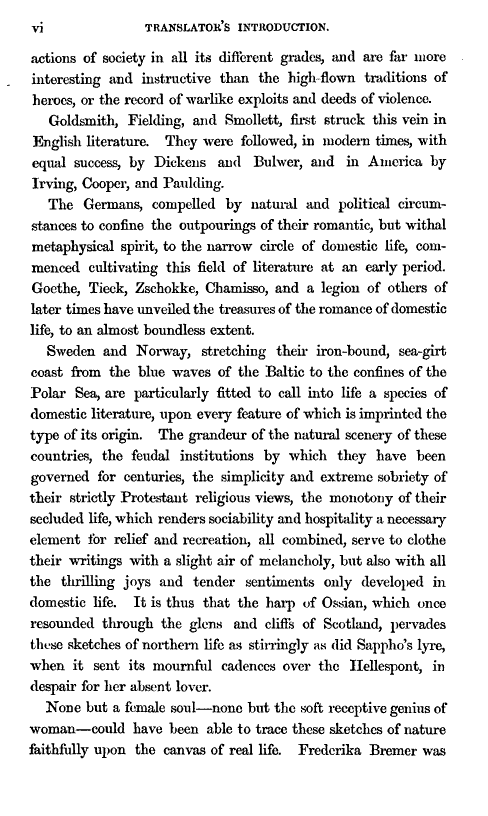
Full resolution (TIFF) - On this page / på denna sida - Translator's introduction.

<< prev. page << föreg. sida << >> nästa sida >> next page >>
Below is the raw OCR text
from the above scanned image.
Do you see an error? Proofread the page now!
Här nedan syns maskintolkade texten från faksimilbilden ovan.
Ser du något fel? Korrekturläs sidan nu!
This page has been proofread at least once.
(diff)
(history)
Denna sida har korrekturlästs minst en gång.
(skillnad)
(historik)
actions of society in all its different grades, and are far more
interesting and instructive than the high-flown traditions of
heroes, or the record of warlike exploits and deeds of violence.
Goldsmith, Fielding, and Smollett, first struck this vein in
English literature. They were followed, in modern times, with
equal success, by Dickens and Bulwer, and in America by
Irving, Cooper, and Paulding.
The Germans, compelled by natural and political
circumstances to confine the outpourings of their romantic, but withal
metaphysical spirit, to the narrow circle of domestic life,
commenced cultivating this field of literature at an early period.
Goethe, Tieck, Zschokke, Chamisso, and a legion of others of
later times have unveiled the treasures of the romance of domestic
life, to an almost boundless extent.
Sweden and Norway, stretching their iron-bound, sea-girt
coast from the blue waves of the Baltic to the confines of the
Polar Sea, are particularly fitted to call into life a species of
domestic literature, upon every feature of which is imprinted the
type of its origin. The grandeur of the natural scenery of these
countries, the feudal institutions by which they have been
governed for centuries, the simplicity and extreme sobriety of
their strictly Protestant religious views, the monotony of their
secluded life, which renders sociability and hospitality a necessary
element for relief and recreation, all combined, serve to clothe
their writings with a slight air of melancholy, but also with all
the thrilling joys and tender sentiments only developed in
domestic life. It is thus that the harp of Ossian, which once
resounded through the glens and cliffs of Scotland, pervades
these sketches of northern life as stirringly as did Sappho’s lyre,
when it sent its mournful cadences over the Hellespont, in
despair for her absent lover.
None but a female soul–none but the soft receptive genius of
woman–could have been able to trace these sketches of nature
faithfully upon the canvas of real life. Frederika Bremer was
<< prev. page << föreg. sida << >> nästa sida >> next page >>